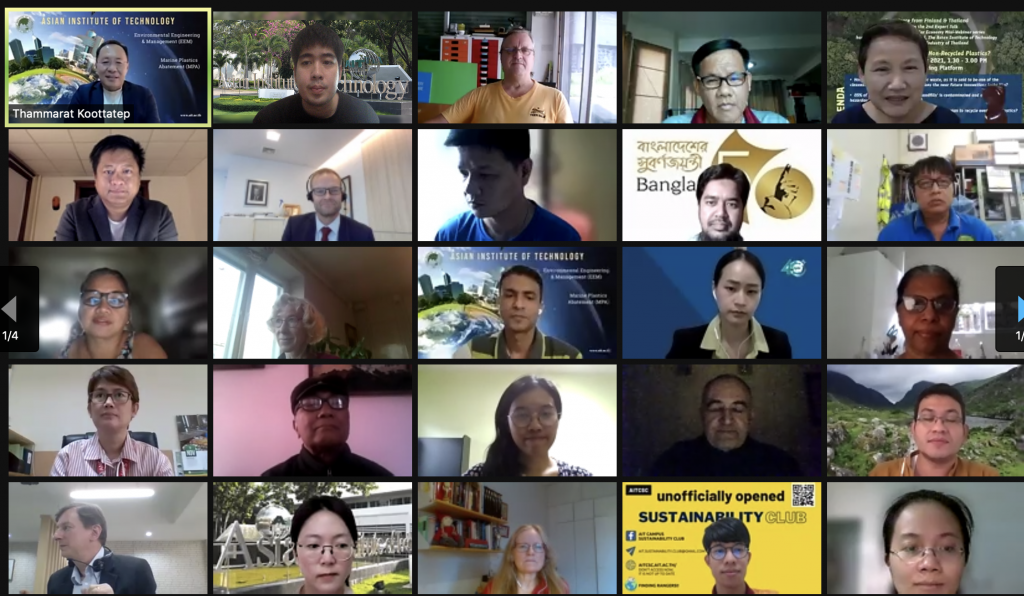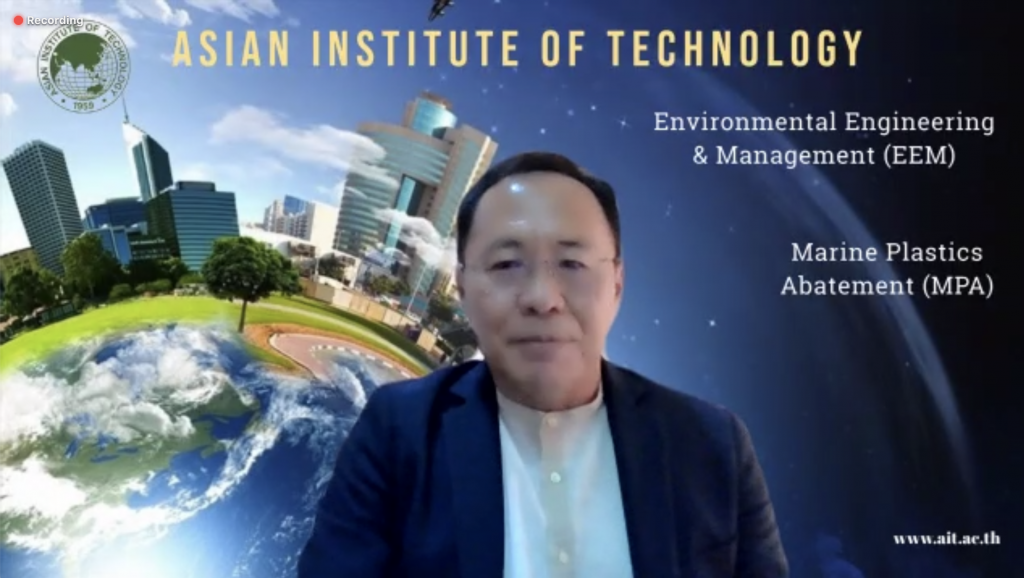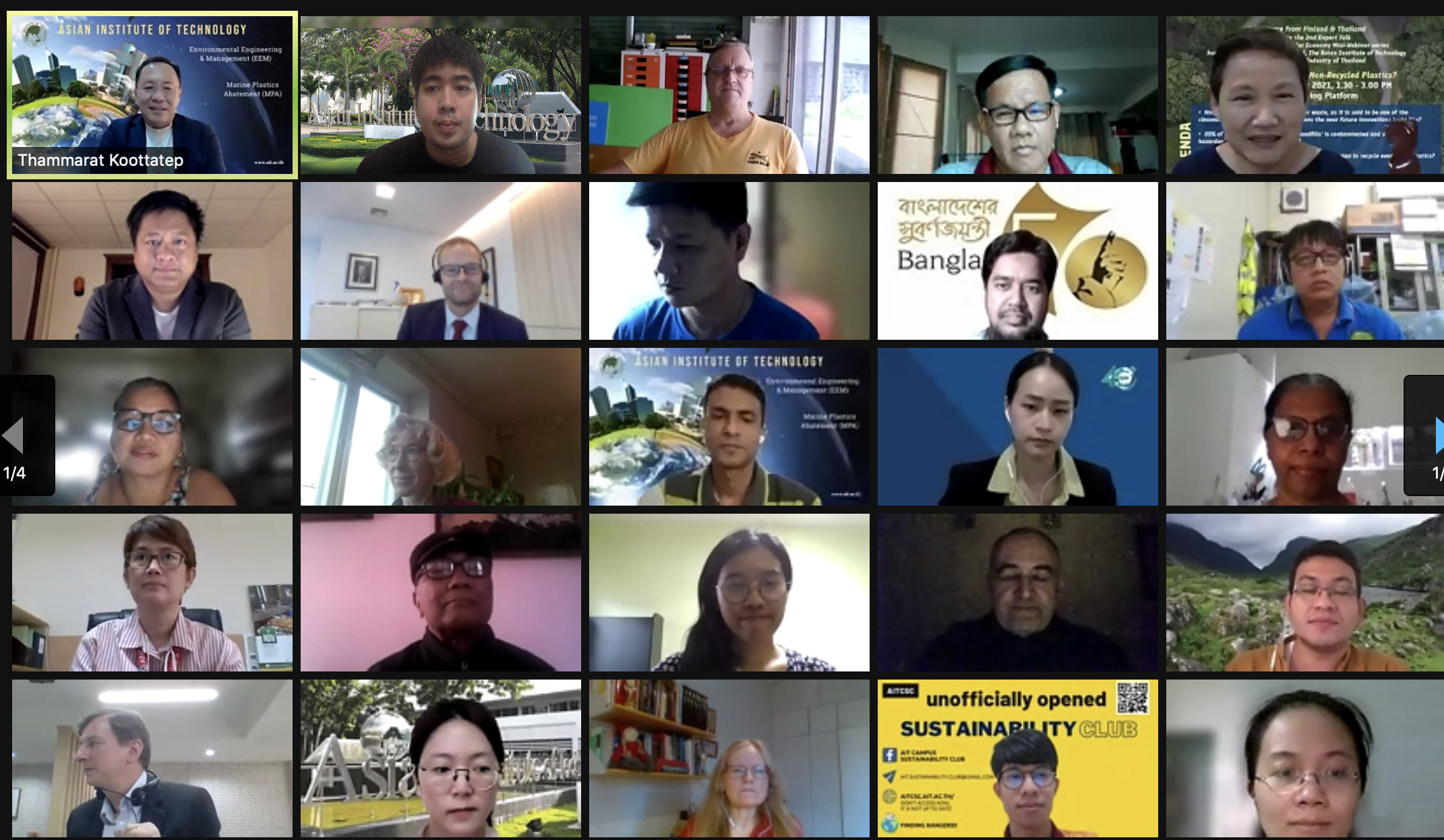By Nitipol Kiravanich
November 11, 2021 — The Asian Institute of Technology (AIT) together with the Embassy of Finland in Bangkok, and Ministry of Industry (MoI) co-organized an online webinar on ‘Circular Economy Webinar Episode II: How to Deal with Non-Recycled Plastics?' where participants from important bodies of private sectors, university, and institutions were of the same opinion on managing non-recyclable plastics in accordance with their expertise.

Marine Plastics Abatement (MPA) from the School of Environment, Resources and Development (SERD) has long been a contributor to combat marine plastic litters with advanced technologies and management practices. The program foresaw this issue to be a world crisis to humanity, therefore, over the years AIT’s program has partnered with important agencies to collaborate on addressing and establishing solutions to the problem.
The webinar is organized to address non-recyclable plastics, encourage the use of recyclable materials instead of single-use plastics, and discuss important initiatives taken by involving parties. The attempt to tackle this world environmental issue was presented by Head of Department of Environmental Engineering from Kasetsart University Dr. Suchart Leungprasert, Assistant Chief Financial Officer from TPBI Public Company Limited; Ms. Shuleeporn Borrisuttanakul, Global Head of Sustainability Communications & Advocacy from Indorama Ventures; Mr. Colm Jordan, Leading research scientist at Finnish Environment Institute; Dr. Jaana Sorvari and Ms. Mona Arnold, Principal Scientists at VTT Technical Research Centre of Finland.
H.E. Mr. Jyri Järviaho, the Ambassador of the Republic of Finland to Thailand, gave an opening remark voicing his appreciation towards involving parties for organizing the webinar, noting that “non-recyclable plastic is a challenge in Thailand, as well as to other countries as we all know, plastic causes serious harm to our environment.”
However, H.E. Järviaho also added that plastic can be a source of value when managed properly.
The Ambassador said the European Union (EU) has set a target to circulate 50 percent of all plastic packaging by 2025. To achieve that, Finland is determined to effectively collect and manage plastic packaging – chiefly through the reuse of household plastics and the burning of plastic for energy usage. “I think we have not only the good reason, but an urgent necessity to react and prevent plastics from entering the hazardous landfills, seas, or water systems,” H.E. Järviaho concluded.
Kasetsart University’s Head of the Department of Environmental Engineering, Dr. Leungprasert, shared his research projects which investigated non-plastic waste in Thailand in popular islands such as Lipe, Pha-gan Samui, and Phuket. With an aim to identify plastic waste on the beach and in the ocean, the research will eventually assist the use of plastics in circular economy.
Ms. Borrisuttanakul, Assistant Chief Financial Officer, representing TPBI Public Company Limited -- a one-stop packaging, highlighted “Won Project” – a Thai name for ‘circular project’ with a tagline of “the answer is the circular economy.” The project starts with a packaging being manufactured, being consumed, being recycled, then, alas, returning to the steps of being manufactured and so on. In this way, “new resources will be used less and less,” concluded Ms. Borrisuttankul.
In addition to integrating the waste management into its production process, TPBI works to raise awareness in waste management through the system of incentivizing. With every 5KG of stretchable plastics donated by a consumer, a five Thai Baht will be paid in return. “Waste separation is the key, and awareness of consumers is the most important aspect”, the TPBI Assistant Chief Financial Officer concluded.
Similarly, the Global Head of Sustainability Communications & Advocacy from Indorama Ventures Mr. Jordan also shared the management and recycling model that helps integrate the business into circular economy – from designing products to be recyclable to designing waste collection system to complete the cycle. “If you meet these four criteria, we believe you can truly call yourself recyclable and this is how we feed into circular economy,” Mr. Jordan said. The company is regarded as number on in the world as PET recycler and producer, with a target to recycle 50 billion bottles per year by 2025 and to invest 1.5 billion USD to achieve this.
With government, public and private sectors all shared good practices, AIT Professor Thammarat Koottatep, Academic Chair of Marine Plastics Abatement Program, posed questions to participants to clearly highlight the management of non-recyclable plastics. To this, TPBI representative pointed to the product and packaging design to eliminate unnecessary non-reusable recycling materials. Mr. Jordan, on the other hand, emphasized the chemical recycling process which requires a certain investment in technology to safely dispose plastics from environment.

It is clear that plastics have contributed to world serious issues and those are being amplified now than ever. Although plastic is realized as a crucial threat to humans and the planet, this matter is also an opportunity worth investing in now to complete the cycle of production to consumption.
This online webinar is marked as the second webinar to the series on ‘Circular Economy’ which the first held on September 30, 2021, titled ‘Circular Economy Webinar Episode I: Industrial Emission Monitoring’ centered upon air pollution in industries where leading experts from Thailand and Finland shared experiences and lessons learned, with a focus on the development of the countrywide industrial emission monitoring system in Thailand. The third webinar of this series is expected to organize in December 2021.

